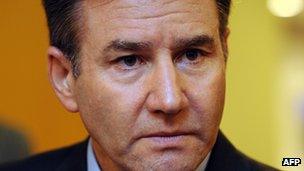Glencore chief says he could scrap Xstrata merger
- Published

Glencore chief executive Ivan Glasenberg is refusing to compromise over the terms of the deal
Glencore's chief executive has rejected demands by a key shareholder of Xstrata to improve terms ahead of a proposed merger with the miner.
Ivan Glasenberg warned Qatar Holding that the commodities trading giant could walk away from the deal, saying it was "not a must-do deal".
The takeover would involve Xstrata investors swapping each of their shares for 2.8 newly issued Glencore shares.
But the Qatari sovereign wealth fund has been demanding a ratio of 3.25.
Xstrata shareholders are preparing to vote on the deal on 7 September. Qatar Holding, Xstrata's second-largest shareholder, has about 12% of the firm - enough to potentially block the merger.
"We cannot understand the position of the Qataris, asking for more than the 2.8 ratio. We have seen nothing coming out of recent results that supports this, in fact we have seen quite the opposite," said Mr Glasenberg.
"It is not a must-do deal. It is a deal that we believe makes sense … but if shareholders have another opinion it is their choice," he added.
The Anglo-Swiss miner agreed to a merger in February with Glencore, its largest shareholder, which was valued at $90bn.
Glencore buys and sells metals, crops and fuels in the financial markets and invests in mining companies. A merger with Xstrata would allow Glencore to control a swathe of businesses from mining to refining, storage and shipping of basic commodities like coal, copper and corn.
But the deal stalled in June after Qatar Holding demanded better terms.
Glencore already holds a 34% stake in Xstrata.
Commodity prices hit profits
Meanwhile Glencore blamed weak raw materials prices for a 26% drop in net profit in the first half of the year.
A sluggish world economy was behind a 15% fall in commodity prices, driven by the sovereign debt crisis in Europe, and slowdown in China and the US.
Net profit, excluding one-off items, amounted to $1.8bn (£1.1bn) from a year earlier, it said in a statement., external But the figure was better than market expectations for a forecast of $1.6bn. Revenue rose 17% to $108bn in the same period from $92bn year on year.
"Financial markets were relatively optimistic entering 2012, following the sovereign debt-related challenges experienced during the first half of 2011," said Mr Glasenberg.
"This optimism generally faded as the half progressed and, with it, expectations for economic growth and commodity prices. Concerns over how precisely the European situation would and could be resolved have continued to erode global risk appetite," he added.
Along with political uncertainty in xthe world's two largest economies, China and US, because of elections, "these factors... are likely to continue to hinder the gradual process of underlying economic recovery following the 2008 financial crisis".
He said he expected neither improvement in the overall market or economic conditions in the near future.
Its share prices was down 0.21% in London noon trade.
- Published21 August 2012
- Published2 February 2012
- Published8 February 2012
- Published5 March 2012